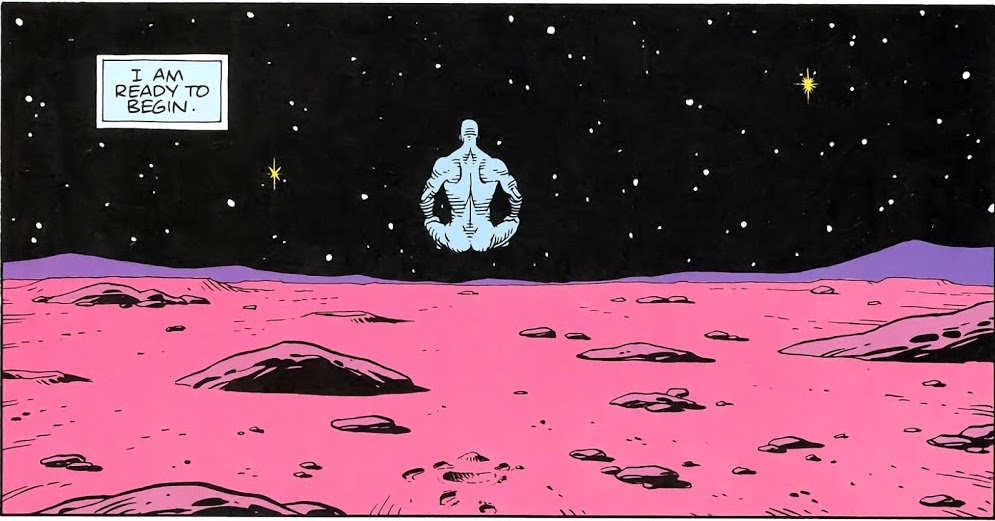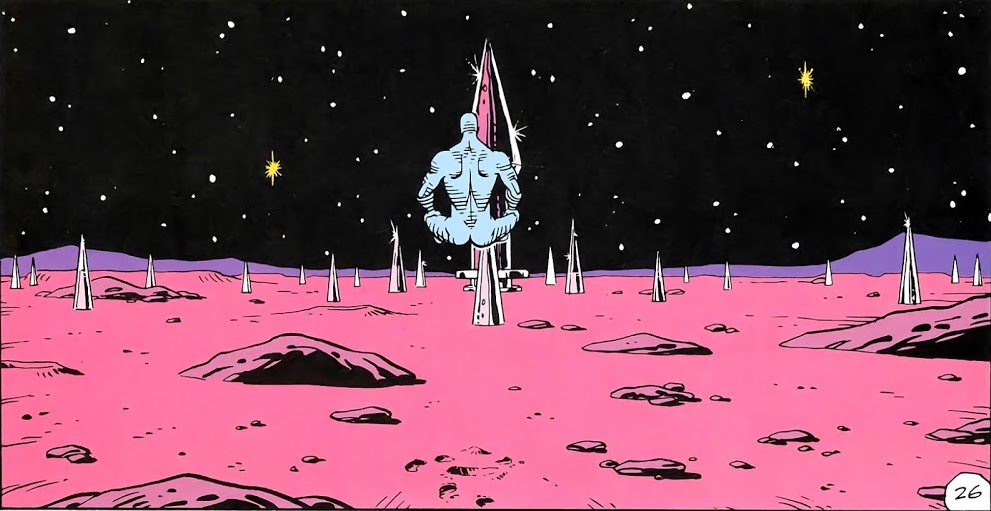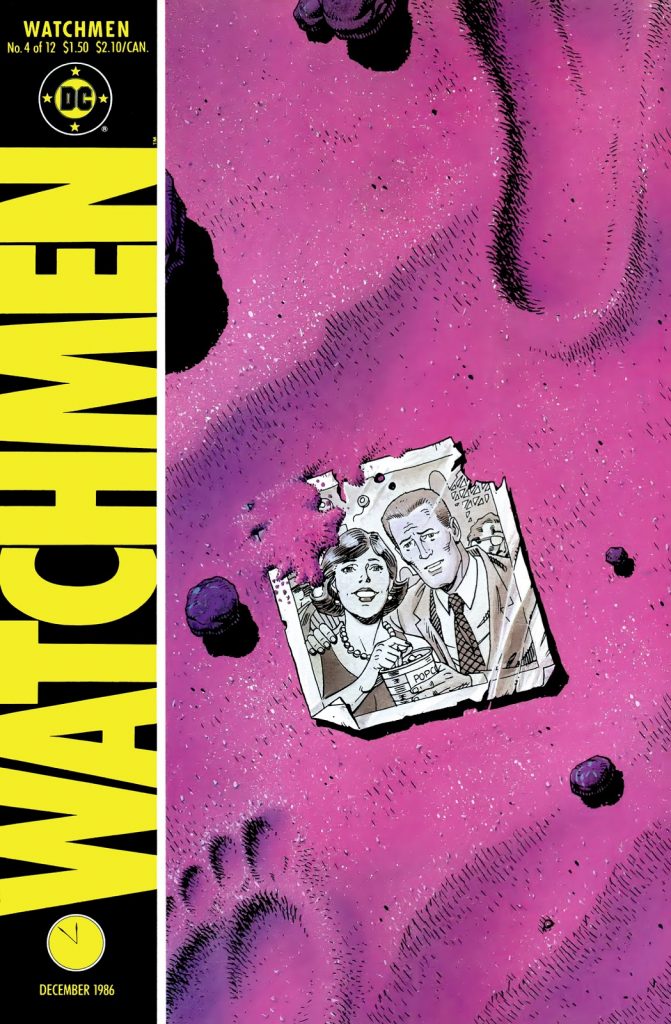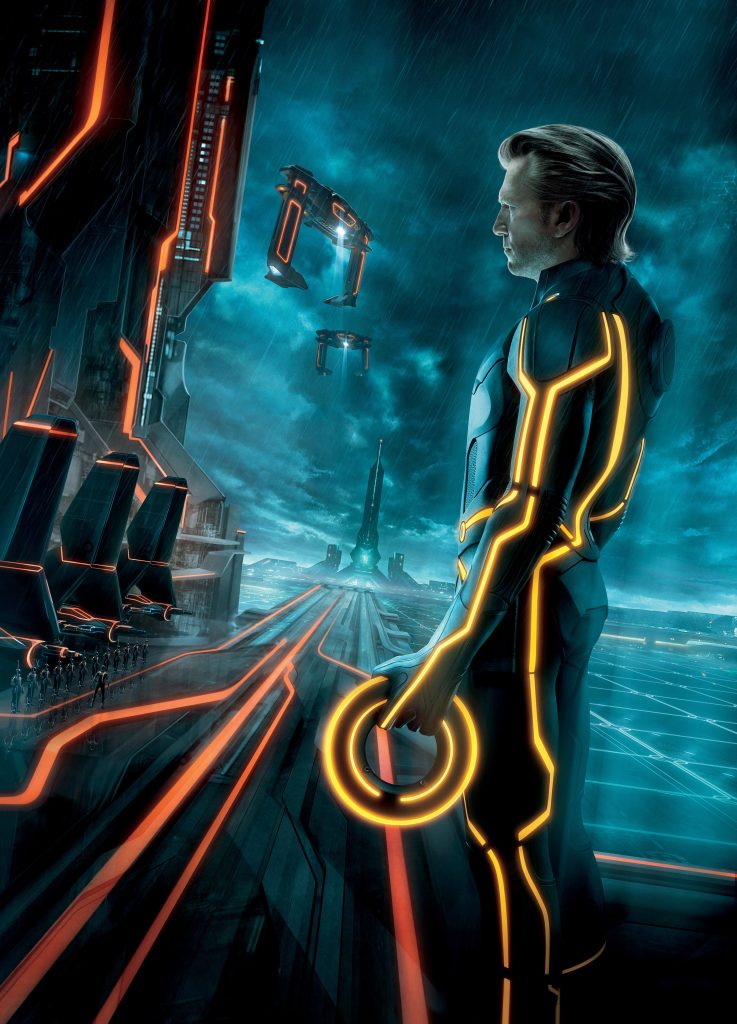Let’s discuss the idea of God in John Milton’s “Paradise Lost.” Milton explores the complexity of God’s character, which can appear tyrannical and prejudiced against humanity. While it is easy to side with Satan, who views God as an incumbent power, God’s uncreated and unseen nature poses a problem for understanding his true nature. I suggest that the character of Dr. Manhattan, while not a God, can be useful in understanding the truth of God in “Paradise Lost.”

The Problem of an Invisible God in Paradise Lost
In Paradise Lost, the first thing God does is pass a judgment on humanity. He states that he made humans just and right, with the ability to stand or fall freely. However, this seemingly positive statement takes a negative turn when one considers that the mere mention of the possibility of falling implies that God knew humans would eventually fall. In this way, God’s initial statement can be interpreted as an immediate and comprehensive condemnation of humanity. This sets the tone for the rest of the poem, in which humanity is seen as flawed and in need of redemption. (Victoria Silver, 43)
“I made him just and right, Sufficient to have stood, though free to fall." (3.89-99) "Paradise Lost", John Milton.
“Paradise Lost” presents a unique portrayal of God that differs from traditional views. The poem explores this concept masterfully, but not in the way readers might expect. When first encountering God in the poem, readers may sense that something is off about his portrayal as an omnipotent figure lounging on his throne in Heaven. This feeling is further complicated by the idea that God knew humans would fall, which begs the question of whether they were destined to do so. This raises doubt about the authenticity of God’s intentions and causes some readers to side with Satan and his “devilish propaganda,” which views God as an incumbent power upheld by old repute, consent, or custom.
The portrayal of God in Paradise Lost can be confusing. At first, readers may think that God is evil and purposely set up humanity to fail because he knows everything. However, God is different from other characters in the story because he is uncreated and never seen. This leads to what is called “The Problem of God.” The angel Raphael tries to explain the War in the Heavens to Adam by comparing it to something he can understand. But unlike Raphael, the narrator in Paradise Lost never prepares readers for the idea that the portrayal of God should not be taken literally. This causes confusion, and readers interpret God as an old man with a beard sitting on a throne, when in fact, God is meant to be obscure and hidden. The narrator assumes that we are familiar with the “iconological fact” that God sits on a throne, with the son by his side and the holy spirit implied but unseen. But part of the problem is not with God himself, the problem stems from us wanting to represent God as a king. And what is a monarchy if not a tyrannical and oppressive form of government that must be overthrown?
"High matter thou enjoins me, O prime of men, Sad task and hard, for how shall I relate To human sense th' invisible exploits Of warring spirits, how without remorse The ruin of so many glorious once And perfect while they stood; how last unfold The secrets of another world, perhaps Not lawful to reveal? yet for thy good This is dispensed, and what surmounts the reach Of human sense, shall I delineate so, By lik'ning spiritual to corporeal forms, As may express them best, though what if earth Be but the shadow of heaven, and things therein Each to other like, more than on earth is thought?" (7.563-76) "Paradise Lost", John Milton.
Satan’s Delusions and the Limits of Language
In Paradise Lost, God is presented in a complex and somewhat ambiguous manner. While he speaks of his grace and mercy, he also makes a harsh judgement on the frailty of his intelligent creatures. Satan challenges God’s actions, arguing that God could have prevented the Fall of humanity and angels if he truly wanted to, but instead he caused it. This idea suggests that God is the cause of all evil. However, Milton’s God responds by saying that he formed humanity free, and they must remain free until they enthrall themselves. He also notes that revoking their freedom would require changing their nature and going against the eternal decree. This response raises questions about God’s true intentions and the possibility that there may be more at play than what is visible to human readers.
"I formed them free, and free they must remain, Till they enthrall themselves: I else must change Their nature, and revoke the high decree Unchangeable, eternal, which ordained Their freedom, eternal they themselves ordained their fall." (3.120-28), "Paradise Lost", John Milton.
Despite the complexity of God’s character, the portrayal of him in Paradise Lost is not meant to be taken literally. The narrator never explicitly explains that the depiction of God is not meant to be taken at face value, which leads readers to interpret him in a literal sense as an old man with a beard sitting on a throne. However, the text suggests that God and the Son are meant to be obscure and hidden from the reader on purpose. This idea is further supported by the angel Raphael’s warning to Adam that the War in the Heavens can only be retold if it is likened to something Adam’s mind can understand. Ultimately, the ambiguity of God’s character serves to highlight the limitations of human understanding and the mysteries of the divine.
Exploring the Intersection of Free Will and Predestination
The question of how free will can coexist with God’s omniscience is a complex one, but I want tooffer an interesting analogy. I want you to compare God to a clockmaker or craftsman, who created the universe as a clock that cannot be stopped. Just like Dr. Manhattan in “Watchmen,” God perceives time as a whole rather than linearly, and therefore already knows what will happen in the future.
I argue that God in “Paradise Lost” lacks the terrifying presence of God in the Bible and is more like a character in the story who is bound by its narrative structure. However, I assert that God’s foreknowledge does not make him a tyrant because he exists outside the narrative of the poem. God’s uncreated nature means that he sees everything as it is, was, and will be, but he cannot change anything because that would go against the free will that he created. In other words, God created a universe defined by choice, and altering it would be like trying to alter the course of a ticking clock.
While God may exist in the poem, he is not a character in the traditional sense. God’s true existence is unknowable, and what readers perceive as God is only a fraction of his infinite being. The fact that we call him “God” is due to our inability to know his true name. I also argue that equating Dr. Manhattan to God is a misunderstanding because it would be making God like us, a physical being of immense power. God in “Paradise Lost” is everything but physical, and his high decree is unchangeable because it is the first choice made in a universe defined by choice.
In Paradise Lost, Satan denies the existence of God and instead views Him as a physical being of immense strength. Satan insists on calling angels “deities” and “gods” and revolts against Heaven. However, to believe in God is to acknowledge that He is uncreated while the rest of the universe is created. Challenging God is to disregard His infinite and uncreated existence and the absolute distinction between deity and the created world.
According to Paradise Lost, created beings are only capable of understanding other created things. This means that even Satan cannot comprehend the unfathomable nature of God in Paradise Lost. Raphael relates the “War in the Heavens” to Adam and Eve because although the angels are considered divine, they are still created beings, and humans can only understand other created things.
In the poem, while characters move and take action, God in Paradise Lost remains still. The Son, on the other hand, has the power to simply vanish fallen angels with a gesture. The nature of God and the Son in Paradise Lost is more complex than what is presented in the poem. What readers see of God is only what God wants us to know and understand about our relationship with him. This is what Milton intends to teach his readers. The appearances of God in the poem, such as speaking or thinking, are merely separate elements of God’s self-revelation that do not form a cohesive body. These elements serve as figures of speech, and the narrator presents them in a way that accommodates human understanding. (Silver, 47)
I argue that it is important to understand God in Paradise Lost beyond what appears on the surface level. The accommodations made in the poem to make God understandable to humans can be misleading if taken too literally. While the point of the poem is to explain the ways of God to man, it is important to understand that God in Paradise Lost is not a tyrant or oppressor, but rather something beyond human comprehension.
To fully understand God in Paradise Lost, readers must engage with the text using all dimensions of human understanding. Calling God a tyrant reflects a limited idea of God, as it tries to make God fit into human expectations and limitations. The point of the poem is to show how different God is from humanity, and reading God in a literal sense may lead to the assumption that God is evil. However, this assumption is a reflection of the reader’s desire to make God more relatable to human experience.
I suggest that perhaps the Fall was always meant to happen, but John Milton leaves this possibility open to interpretation. Overall, the message is that to truly understand God in Paradise Lost, readers must look beyond the accommodations made in the text and recognize the limitations of human understanding.
Understanding the Narrator’s Depiction of God in Paradise Lost
As readers, we must navigate through the allegorical figures and metaphorical language used by Milton to understand the complexities of God and the universe in Paradise Lost. It is crucial to remember that what we see and interpret is not necessarily the truth, but rather a representation of it. The characterizations of God and the angels, as well as the events that take place in the poem, must be read with a critical eye and a willingness to delve deeper into the text. The nuances and subtleties in Milton’s work are what make it a masterpiece, and it is through close reading and reflection that we can fully appreciate the depth and complexity of his ideas. Ultimately, it is up to us as readers to determine what we take away from Paradise Lost and how we use its lessons to better understand our own place in the world.
"The father first the sung omnipotent, Immutable, immortal, infinite, Eternal king; thee author of all being, Fountain of light, thyself invisible Amidst the glorious brightness where thou sitt’est Throne inaccessible, but when thou shad’st The blaze of thy beams and through a cloud Drawn round about thee like a radiant shrine, Dark with excessive bright thy skirts appear, Yet dazzle heaven, the brightest seraphim Approach not, but with both wings veil their eyes. Thee next they sang of all creation first, Begotten son, divine similitude, In whose conspicuous countenance, without cloud, Made invisible, th’ almighty father shines, Whom else no creature can behold; on thee Impressed the effulgence of his glory abides, Transfused on his ample spirit rests." (3.373-87), "Paradise Lost", John Milton.
Revisiting Our Understanding of God in Paradise Lost
God in Paradise Lost is uncreated. The only figure visible in heaven is the Son. He is the “personage image of God.” The Son is made where God is unmade, divine but not eternal. He is seen and heard where deity is hidden. Of divine nature bestowed but not original to him. Without the Son, God cannot act inside the created universe. In a way, The Son is God’s avatar. (Silver, 53).
In the Son’s exhaltation, Satan’s delusion of likeness to God is exploded. The acts of God in Paradise Lost defy process of speech and the constraints of time and space that speech encodes.
As the outcome of the “War in the Heavens” proves, Satan in his faithlessness reckons without Milton’s God, whose goodness infinite, goodness immense” (12.469) invariably brings out good out of evil. The question of whether God caused Satan’s revolt or if Satan chose to rebel on his own is a complex one in Paradise Lost. Adding to the complexity is the fact that the Son’s self-sacrifice in the future is undoing Satan’s triumph over Adam and Eve. It’s almost like all these events are happening at once and were predestined. But, if everything was predestined, does that mean that Adam and Eve were never truly free?
In Paradise Lost, the line between good and evil can be blurred and misunderstood. As human readers, it’s easy for us to see God’s actions as unjust or evil. However, in the universe of Paradise Lost, which exists outside of time and space, everything is happening simultaneously – past, present, and future. It’s a world of predestination where God created a free universe that is constrained by the boundaries of time and space. Once the universe began, it would expand and collapse endlessly, with all things happening at once and all choices influencing every choice. It’s a perfect series of events that fall into place one after the other, faster than time or motion. Understanding God in Paradise Lost requires accepting that God doesn’t exist, except when he does. It may seem illogical, but that’s the nature of this universe.
Exploring the intricacies of faith and the nature of God in Milton’s Paradise Lost has been a challenging yet rewarding journey. As Victoria Silver aptly notes, our interpretations of God reveal more about ourselves than they do about the divine. It is through the lens of our own experiences, biases, and imaginations that we understand and respond to the concept of God. Paradise Lost challenges us to confront the complexities and contradictions of faith, and to recognize the limitations of our own understanding. Ultimately, the poem invites us to engage in an ongoing dialogue with the divine, to grapple with the mysteries of faith, and to seek meaning and purpose in our own lives. As readers, we must approach Paradise Lost with humility, curiosity, and a willingness to be transformed by the questions it raises.

“Faith not only believes against the appearances of our own vanity demands of God, it is a feat of the imagination, a response to an interpretative dilemma that reveals less about deity than it does about ourselves.”
Victoria Silver
Sources



- Silver, Victoria. “The Problem of God.” The Cambridge companion to Paradise Lost, edited by Louis Schwartz, Cambridge University Press, 2014, pp. 42-54.
- Moore, Alan , and Dave Gibbons. Watchmen No. 4. DC Comics, 1987.
- “See How They Fly.” Watchmen, created by Damon Lindelof, performances by Regina King, Yahya Abdul-Mateen II, Jeremy Irons, season 1, episode 9, HBO, December 15, 2019.
- “Martial Feats of Comanche Horsemanship.” Watchmen, created by Damon Lindelof, performances by Sara Vickers , Tom Milson, Jeremy Irons, season 1, episode 2, HBO, October 27, 2019.
- Paradise Lost by John Milton.

Leave a Reply
You must be logged in to post a comment.